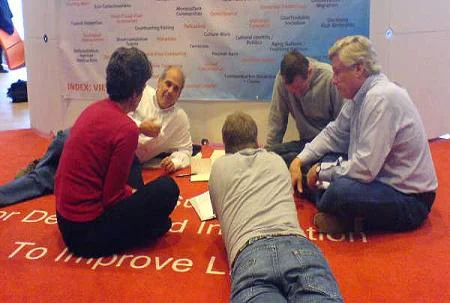In-Group and Out-Group
1. An individual of in-group is a member himself and he expresses concern and sentimental attachment with the group which includes pride and love just as our family, any lovely city, our homeland etc. whereas in out-
group, the individual.is not a member himself so he shows unconcern and detachment, tells its weaknesses, showing his inferiority just like other family, stronger city etc. and expresses his words like that those people are disrespectful, thieves and the city is dirty etc.
2. In-group often refers to good qualities just as my family comes of a good race, our family has good traditions, nothing like my city, my country people are most beautiful and brave whereas out-groups refers to weaknesses generally rather always, in which disgrace or inferiority is shown just your family or low worker, you belong to an inferior race, and the people of Bharat are coward and cunning etc.
3. There is a love with the beliefs, traditions and customs of in-group because of acquaintance there is pride and liking, that is, thought as a sign of unity'and group stability and there is a passion of sacrifice for their preservation and security whereas out-group beliefs are ridiculed and disliked and are thought injurious for society. There are tried to distort consciously just as, in American society, Muslims are presented as terrorists, cruel and bloody people and by concealing the cruelty and terrorism of the American society, it is presented as a civilized nation.
Formal and Informal Group
Formal groups come. into existence because of increase in population in the modern age for specific condition, these groups are best for specific purpose. In early ages, population was less and in villages the most of the needs of social life were fulfilled informally in basic groups. From structural point of view, both
formal and informal groups are opposite of each other. Therefore, sociologists have defined only formal group and informal group have been brought under discussion from this reference. As Robertson says, "Formal group is big secondary group which is brought into existence for the advancement of an objective consciously."
In the words of Schaefer, "Formal group is a special purpose group designed and structured in the interests of maximum efficiency." (R.T. Schaefer 1989).
It can be deduced from the'above definition that formal or informal groups are formal on the basis-of structure, importance of aims and objective of relations of a group, the detail of which is given by the characteristics of the groups.
Characteristics of Formal and Informal Groups :
l. A Formal Group has discipline in a stressed manner and its structure is in a regular organized manner. Members are aware of their duties are rights but Informal Group has a loose discipline and duties are not fixed seriously.
2. Formal group has fixed rules and regulations. For membership, there are fixed standards and the members have to abide by these and going against these rules they are punishable under rules whereas in informal group there is no standard of eligibility for members and there are no formal sometimes for it.
3. Formal Group comes into existence for a specific purpose and all activities of members focused that objective and their abilities coincide with the objectives but in Informal Group, there are no fixed objectives and as such the members are not required to have specific abilities. Just as in a college, teacher makes a formal group. Its aim is to educate. Therefore, all the activities will concern about education and only those people will be eligible to become its members who are either educated or have a tendency of teaching whereas group of friends is informal and its members may be doctors, teachers and government servants also.
4. The relations of the Formal Group members are specifically under rules and protocol is taken into consideration and there are different groups but in an Informal Group, relations are informal and interaction is-less deep and is of temporary nature. Formal groups come into existence for big and collective purposes in a society that is why to keep.its structure stable the relations of its members are kept subject to'restrictions of sanctions and formal actions just big business concern, bureaucracy, police force are Formal Groups.
5. The life in a Formal Group is of a special manner because specific activities for the achievement of specific objectives affect the personality of a member for a long time and because of this the characteristics of a
formal group become the part of characteristics of the personality of the individual and the group becomes'a sign of recognition of his member. A person related with police force has many characteristics developed in him and his way of speaking, walking and thinking has a specific colour and other people can easily recognize him as belonging to a specific group but in the ease oi informal group, effects are temporary and are not permanent.
For example, people watching a match from an informal group and interaction is any of superficial nature and the effects are temporary on the personality of the individuals. The example of formal groups is Bar Council, Bureaucrats, educationalists, actors associations, trade unions etc.
The visitors cf a match, the practice pants of a meeting, friends in a marriage party or viewers of a film in the cinema or a drama are informal groups.









0 Comments